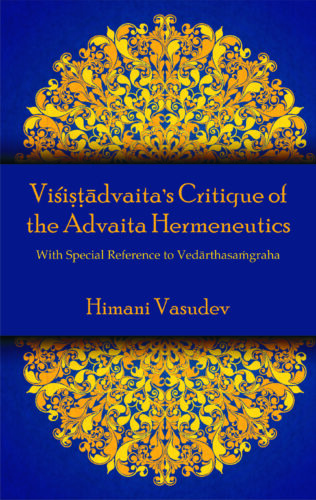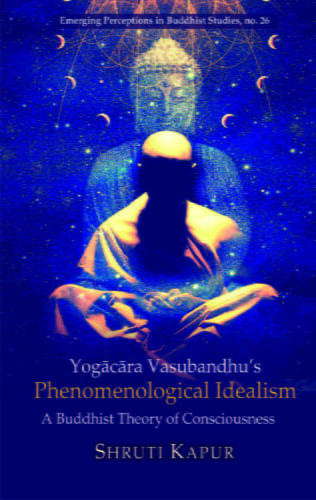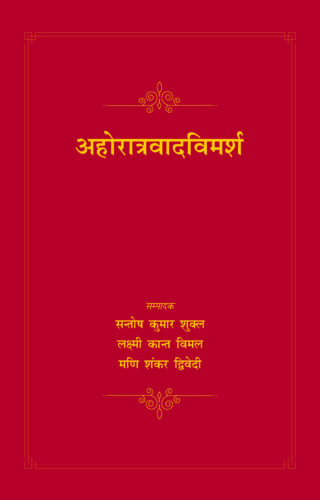Showing 61–66 of 66 results

The multidimensional approach to Vedānta Science Technology extends the core scientific ideas of Vedānta to social, cultural, aesthetic and religious principles. The effort is to present a wide spectrum of intellectual discourse trying to discover fundamental scientific and technological aspects of Vedānta studies.
Vedānta texts have been well known for their richness in fundamental scientific and technological principles with strong potential for research and development today. In fact, much of ancient India’s remarkable achievements in science and technology can be credited to Vedantic texts.
This volume – proceedings of the 22nd International Congress of Vedanta held during 27-30 December 2015 at Jawaharlal Nehru University, New Delhi – features 53 scholarly articles from a wide variety of areas of study. The 22nd Vedanta was a confluence of scholars from various disciplines and the papers in this volume bear the imprint of an intense discussion that is usually expected from a good Vedanta seminar. Though the majority of the papers are in English, a few are in Sanskrit and Hindi as well. The papers are grouped under Vedānta Studies, Vedānta and Philosophy, Vedānta and Science, Vedānta and Culture, Applied Vedānta, and Digital Access and Search of Sanskrit Texts.
This multidimensional approach extends the core scientific ideas of Vedānta to social, cultural, aesthetic and religious aspects of studies, creating a wide spectrum of intellectual discourse and trying to discover fundamental scientific and technological aspects of Vedānta studies.
Being a worthwhile addition to Vedānta studies, this volume should invoke keen interest among all those who are deeply into it, be a student, a researcher or a common reader.
Sree Narayana Guru (1856–1928), an enlightened seer, represents Vedanta as a Science of Consciousness or pure Epistemology. This book deals with Guru’s epistemology and shows how it can eliminate many of the problems in philosophy and life.
The Guru conceives Consciousness or Arivu as the one all underlying Reality that assumes the form of everything in the world, both mind and matter.
Epistemologists are usually either idealists or realists, but the Guru is neither. To him there is no need to place one above the other since they are two manifest forms of one Consciousness.
Many eminent persons have tried to solve the problem of consciousness, but could not succeed because they were not ready to consider man as a pure being and the essence of the world as Consciousness.
To the Guru, in every event of knowing there is the coming together of subject, object and also the function of knowing. These three are Consciousness in essence. What we really need is awareness of it. All kinds of divisiveness, conflicts and crises can be solved through an awakening of the inner consciousness of man which is non-different from the one all underlying Reality titled Brahman, Atman or Consciousness.

Vedānta is the very heart of Indian philosophy. The various schools of Vedānta have been explored under diverse categories including ontological and epistemological, but they are a storehouse of so much more. “Hermeneutics” in simple words can be the theory of interpretation and this book has studied the critique of the Advaita hermeneutics by Rāmānujācārya based on Vedic statements like tat tvam asi, tadaikāta bahu syāma, neha nānāsti kiñcana and many others in his book Vedārthasaṁgraha which mirrors a complete vision of the Upaniṣads. Rāmānujācārya has shown how the Śruti statements can be seen in a coherent manner resolving the conflicts of bheda and abheda. The nature of a word and its various śaktis, followed by how successful are words in describing the concepts of sat, cit and ānanda, are also discussed here.
This book is an initial effort in the hermeneutic studies of Indian texts, which have been kept limited to the scope of philosophy, theology or religion alone. Many more linguistic treasures can be found here.
Vedānta is the very heart of Indian philosophy. The various schools of Vedānta have been explored under diverse categories including ontological and epistemological, but they are a storehouse of so much more. “Hermeneutics” in simple words can be the theory of interpretation and this book has studied the critique of the Advaita hermeneutics by Rāmānujācārya based on Vedic statements like tat tvam asi, tadaikāta bahu syāma, neha nānāsti kiñcana and many others in his book Vedārthasaṁgraha which mirrors a complete vision of the Upaniṣads. Rāmānujācārya has shown how the Śruti statements can be seen in a coherent manner resolving the conflicts of bheda and abheda. The nature of a word and its various śaktis, followed by how successful are words in describing the concepts of sat, cit and ānanda, are also discussed here.
This book is an initial effort in the hermeneutic studies of Indian texts, which have been kept limited to the scope of philosophy, theology or religion alone. Many more linguistic treasures can be found here.

This book is a comparative study of the phenomenology of Yogacara Vasubandhu and that of the German philosopher Edmund Husserl having the focus on the understanding of the deeply inner nature of consciousness or mind. It asserts that the Yogacara philosophy is much richer and comprehensive than the Western phenomenology, particularly the Husserlian phenomenology.
This book is a comparative study of the phenomenology of Yogacara Vasubandhu and that of the German philosopher Edmund Husserl having the focus on the understanding of the deeply inner nature of consciousness or mind. It articulates that the Yogacara philosophy is much richer and comprehensive than the Western phenomenology, particularly the Husserlian phenomenology.
Later Vasubandhu’s philosophical orientation was idealist in Indian sense or a phenomenologist in Husserlian sense. His Mahayana Yogacara idealism is based on Asanga’s seminal text Sandhinirmocanasutra and his own Vijnaptimatratasiddhi (Vimsatika and Trimsika together) along with his exploration of the intrinsic theory of consciousness or mind. For one to have a clear-cut understanding of Vasubandhu, the book follows the Husserlian phenomenological approach as a philosophical methodology and also used select terminology wherever required.
This book is expected to be highly useful for students, researchers and teachers in the area of Indian/Buddhist philosophy.
This book is a comparative study of the phenomenology of Yogacara Vasubandhu and that of the German philosopher Edmund Husserl having the focus on the understanding of the deeply inner nature of consciousness or mind. It asserts that the Yogacara philosophy is much richer and comprehensive than the Western phenomenology, particularly the Husserlian phenomenology.

पं˚ मधुसूदन ओझा द्वारा प्रणीत सृष्टि प्रतिपादक अहोरावाद नामक ग्रन्थ का इस पुस्तक में विमर्श प्रस्तुत किया गया है। जिसमें अहोरावाद के विविध विषयों को आधार बनाकर आमिन् त विद्वानों द्वारा लिखे गये विमर्शात्मक शोधपत्रों का संकलन तथा अहोरात्रवाद ग्रन्थ की मूल प्रतिलिपि को समाहित किया गया है।
“अहोरात्र शब्द अहः एवं राि इन दो शब्दों से मिलकर बना है। ‘अहः च रािः च’ ऐसा विग्रह द्वारा द्वन्द्व समास होकर ‘अहोरा’ शब्द निष्पन्न होता है। सृष्टि की उत्पत्ति विषयक अनेक सिद्धान्त आचार्यों द्वारा दिये गये हैं। उन सिद्धान्तों में से सृष्टि सम्बन्धी अहोराविषयक सिद्धान्त अहोरावाद के नाम से जाना जाता है। ऋग्वेद के “नासदीय सूक्त” में सृष्टिविषयक अन्य सिद्धान्तों के साथ अहोरावाद का भी उल्लेख मिलता है। ऋग्वेद के अघमर्षण सूक्त (१०.१९०.३) में कहा गया है कि निमेष मा में ही जगत् को वश में करने वाले परमपिता ने दिन और रात का विधान किया। श्रीमद्भगवद्गीता (८.१७) के अनुसार ब्रह्मा का जो एक दिन है, उसको एक हजार चतुर्युग तक की अवधिवाला और राि को भी एक हजार चतुर्युग तक की अवधि के रूप में जो जानते हैं, वे योगीजन काल के तत्त्व को जानने वाले हैं। बृहदारण्यकोपनिषद् में भी सृष्टि प्रक्रिया के प्रसंग में अहोरा शब्द का अनेक प्रयोग मिलता है। इस उपनिषद् के प्रारम्भ में यज्ञसम्बन्धी अश्व को आधार बना कर उसके अवयव का वर्णन किया गया है। तदनुसार उस यज्ञीय अश्व के सामने महिमारूप से दिन प्रकट हुआ। राि इसके पीछे महिमा रूप से प्रकट हुई। विद्यावाचस्पति पं˚ मधुसूदन ओझा ने सृष्टिविषयक अहोरावाद मत के विषय में विविध वैदिक सन्दर्भों का आलोकन कर अहोरावाद नामक ग्रन्थ का प्रणयन किया है। यह ग्रन्थ कुल १२ अधिकाराें में विभक्त है। प्रतिज्ञा एवं उपसंहार को छोड़कर इस ग्रन्थ के १० अधिकाराें में ज्ञान-अज्ञान, शुक्ल-कृष्ण, प्रकाश-अन्धकार, भाव-अभाव, सृष्टि-प्रलय, द्यावा-पृथिवी, ऋत-सत्य, सप्ताह, यज्ञ और चातुर्हो ये दस विषय वर्णित हैं। अहोरावादविमर्श नामक इस ग्रन्थ में विद्यावाचस्पति पं˚ मधुसूदन ओझाजी के द्वारा प्रणीत सृष्टि प्रतिपादक अहोरावाद नामक ग्रन्थ का विमर्श प्रस्तुत किया गया है। जिसमें अहोरावाद के विविध विषयों को आधार बनाकर आमिन् त विद्वानों के द्वारा लिखे गये विमर्शात्मक शोधपत्रों का संकलन तथा अहोरात्रवाद ग्रन्थ की मूल प्रतिलिपि को कारिकानुक्रमणिका एवं शब्दानुक्रमणिका के साथ समाहित किया गया है।”
दार्शनिक समीक्षा का सत्याग्रह नामधेय यह कृति मेरे द्वारा दिए गए व्याख्यानों का एक परिमार्जित संग्रह है। यह सभी व्याख्यान भारत के प्रतिष्ठित शिक्षा संस्थानों में 2017-18 के दौरान भारतीय दार्शनिक अनुसन्धान परिषद् के अतिथि आचार्य (विजटिंग प्रोफेसर) के रूप में दिए गए थे। ऐसे संग्रह-ग्रन्थ में विचार केन्द्रित अन्विति नहीं होती, और यदि होती भी है तो उसे विचारक-केन्द्रित अन्विति के रूप में ही परखा जा सकता है। विचारों में विचारक-केन्द्रित अन्विति अनुप्रास युक्त पदों से निर्मित एक वाक्य की तरह होती है जिसके अलग-अलग पद आनुप्रासिक सौन्दर्य के साथ अर्थ का अभिधान करते हैं। इसी प्रकार का आनुप्रासिक सौन्दर्य एक व्यक्ति के बहुविध वैचारिक उपक्रमों की सार्थकता होती है। दार्शनिक समीक्षा के रूप में समाकलित इन सभी व्याख्यानों की अन्विति उनके सत्याग्रही होने में है। विचार का सत्य विचारों के मूलगामी अर्थ को उद्घाटित करना है। समीक्षा जब इस उद्देश्य के साथ प्रवर्तित होती है तभी “सत्याग्रह” उसका विशेषण बनता है।
| There are no products |